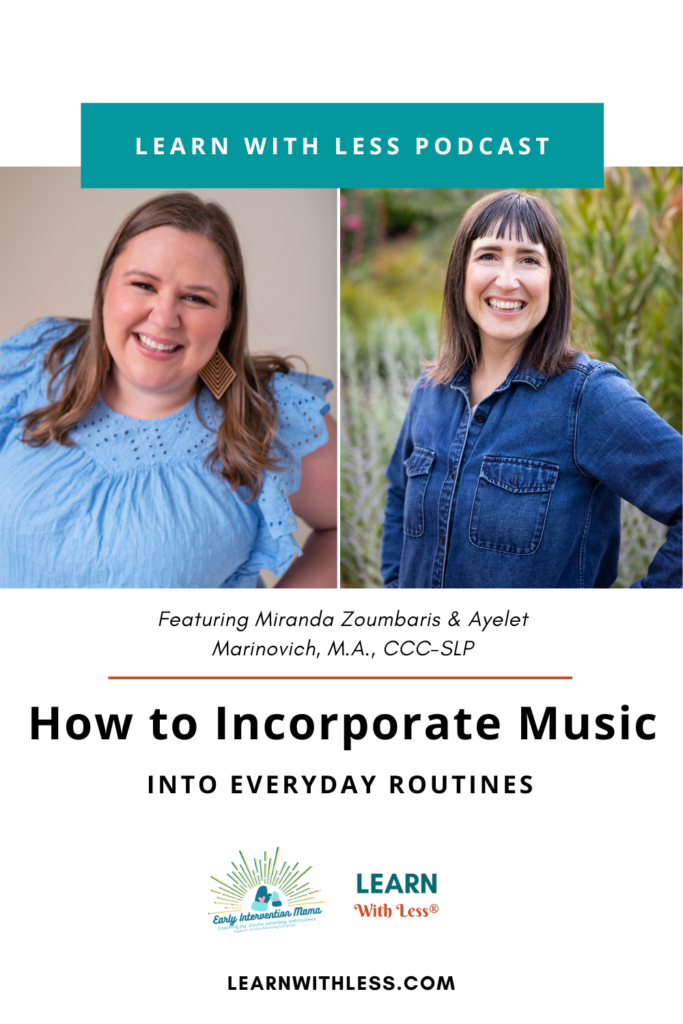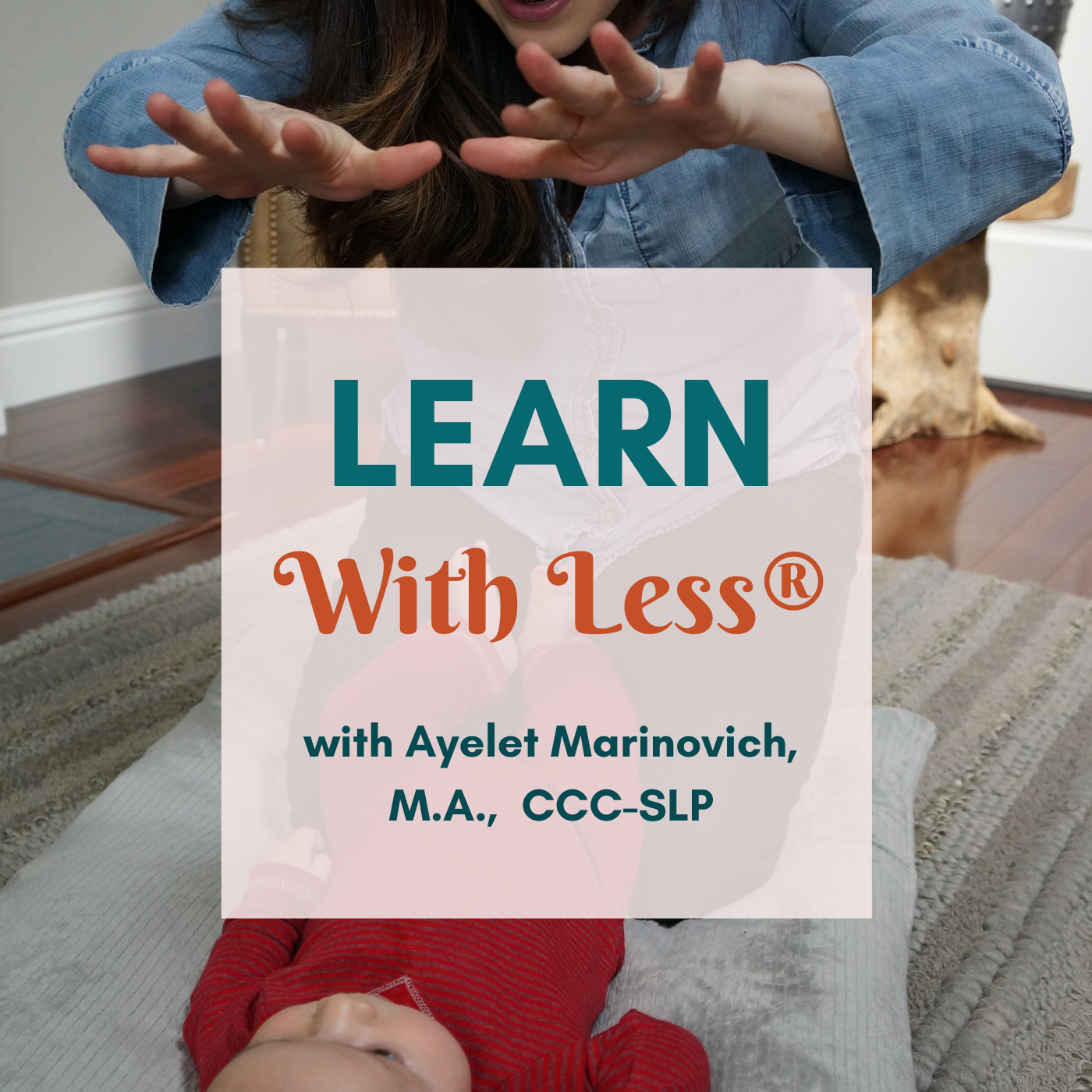How to Incorporate Music Into Everyday Routines, featuring Miranda Zoumbaris & Ayelet Marinovich
Description
Bringing Music Into Your Everyday Routine Can Support Early Learning!
<figure class="wp-block-image alignright size-large is-resized"> </figure>
</figure>This episode of the Learn With Less® podcast is the third of a 4-part series about incorporating play, language, music, and movement, into everyday routines. These episodes feature a conversation between Ayelet Marinovich (pediatric speech-language pathologist, founder and creator of the Learn With Less® curriculum) and Miranda Zoumbaris (early childhood educator & interventionist, licensed Learn With Less® facilitator, and entrepreneur).
In this series, we’ll explore the four pillars of the Learn With Less® framework, and examine how we can incorporate more of each of those into our everyday routines to support connection and early learning.
For each episode, we chose one routine and one everyday object, and explored the ways in which we could infuse developmentally enriching experiences into everyday life, and helping families see they can do this using the time, energy, and materials they already have.
Be sure to check over at our Instagram and Facebook pages (linked below) for additional content that may support your understanding and experience of these episodes. As we release each episode, we’ll link to them here in the show notes so you can access them easily.
In this episode, we discussed:
- What is SING (as we define it in the Learn With Less® curriculum), and how it can be woven into everyday routines
- How to take the routine of transitioning (from one activity to another, from inside to outside, etc), and incorporate more musical elements into these moments
- What kinds of musicality can we infuse into the routines we have when it comes to transitioning between activities
- Using the power of music to create levity in a stressful moment – for both children and adults
- How to incorporate music into simple routines, using simple, everyday objects
- The power of “group sing,” and learning within a group
- How to create inclusive environments for children (or adults) who are reticent or averse to music
- The value of learning in community, of parallel processing with other families, and of experiencing the practice of following your child’s lead, through caregiver and child classes like those led by licensed Learn With Less® facilitators
Helpful Resources to Acknowledge For This Episode:
Daily Routines Freebie: download Miranda’s free handout about winter dressing, and get ideas for incorporating play, talk, sing, and move into your everyday routines!
Free Infant/Toddler Development Blueprint: what are the four major areas of early development… and how can you use the pillars of Learn With Less® to support that learning, using the time, energy, and materials you already have?! Download our free blueprint today.
How to Incorporate Play into Everyday Routines: our first episode in this podcast series, featuring a conversation with Miranda Zoumbaris and Ayelet Marinovich
How to Incorporate Language Into Everyday Routines, the second episode in this 4-part series!
Infant-Directed Speech: Tips for Talking To Your Baby, an early Learn With Less® episode
Learn With Less® Facilitator Training & Certification Program, helping educators and therapists create lasting impact in their communities with a high quality, evidence-based, “plug & play” program
Expand Your Impact Workshop Bundle: for early childhood educators and developmental therapists hoping to serve new families in their community and support themselves, using their existing skills
Learn With Less® Bundle: our best infant and toddler development resources for families and educators alike, including our bestselling books Understanding Your Baby and Understanding Your Toddler, our acclaimed family music album, recorded Learn With Less® “caregiver & me” classes, and a caregiver handout featuring ideas for carryover in the home
Learn With Less® Stories: Testimonials from educators who’ve provided the Learn With Less® infant/toddler family enrichment curriculum and families who’ve experienced our programming.
Connect With Us:
Miranda: Website / Facebook / Instagram
Ayelet: Facebook / Instagram / Pinterest
Text Transcript of this Episode
Ayelet: Okay, welcome back to another episode of the Learn With Less® podcast. I am again joined my my fabulous current co-host Miranda Zoumbaris. Hi, Miranda!
Miranda: Hellooooo!
Ayelet: Hello!
Miranda: I know that’s like almost how I always say hello, when I’m on a call like this. I don’t know why. But…
Ayelet: Well, I would like to propose a thought, which is that, I think it’s because it’s fun and playful and musical. And that is the thing that we’re talking about today. I’m very excited because the last few episodes that we’ve been chatting together have been about the first two pillars of Learn With Less®, PLAY and TALK. And today, we’re going to talk about SING!
I know that SING is sometimes one of those more divisive, maybe… You either know the power of musicality, and you’re always singing to your child or always humming in the shower, whatever it is. Or, you’re like, nope, I am not musical, I am not a singer, I do not want to do that. I do not feel comfortable, I hate all children’s songs. They sound like nails on a chalkboard… or nobody wants to hear me sing or whatever it is!
We all have a story that we have in our heads about what music means to us and our relationship with it. And also, I hope that today, you and I Miranda, can just give people a few extra tools in their toolbox about how they might consider utilizing musicality, and really what that means to us here at Learn With Less® with regards to how we can utilize it with young children, and in our families, and in our daily routines.
Because I know, Miranda, you and I both know that there is a great power in singing and in music. And in utilizing music to enhance, energize, or decrease energy and lull to sleep, our young children, or lull into a more regulated state. Lull into? I don’t think that’s really the term I want to use, but help move into a more regulated state. I don’t think I want to be loaded into a regulated state.
Miranda: We’re gonna lull you in. Yeah. That’s for our podcast listeners, we’re just going to let you lull you in!
Ayelet: Listen to what we say. Anyway. So let’s just talk a little bit. Again, we’ve been doing this structure of sharing with you listeners: what are the definitions about how we define these pillars of PLAY, and TALK and <a href="https://learnwithless.com/podcast/sing-everyday-routines" rel="noreferre





